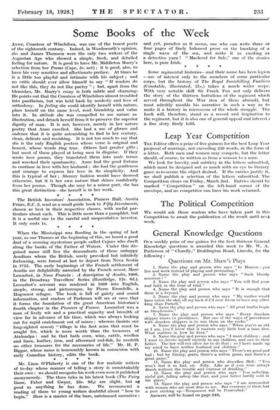Some Books of the Week
ANNE, Countess of Winchilsea, was one of the truest poets of the eighteenth century. Indeed, in Wordsworth's opinion, she and James Thomson were the only two writers of the Augustan Age who showed a simple, fresh, and detailed feeling for nature. It is good to have Mr. Middleton Murry's selection from her Poems (Cape, 5s. net) ; it is good, also, to have his very sensitive and affectionate preface. At times he is a little too playful and intimate with his subject ; and no critic should ever allow himself to say " If readers do not like this, they do not like poetry " ; but, apart from the blemishes, Mr. Murry's essay is both subtle and charming. He points out that the Countess of Winchilsea almost trembled into pantheism, but was held back by modesty and love of orthodoxy. In feeling she could identify herself with nature, place herself on the same level, read friendship and value into it. In attitude she was compelled to use nature as illustration, and detach herself from it to preserve the superior dignity of man. It is not, however, merely in her nature poetry that Anne excelled. She had a use of phrase and cadence that it is quite astonishing to find in her century, clean, delicate and ravishing. It is not too much to say that she is the only English poetess whose verse is original and honest, whose words ring true. Others had greater gifts ; but most of them played at being men in disguise. If they wrote love poems, they translated them into male terms and wrecked their spontaneity. Anne had the good fortune to continue in love with her husband ; she had the gentleness and courage to express her love in its simplicity. And this is typical of her ; literary fashion would have decreed otherwise, but it is her own nature that shines confidently from her poems. Though she may be a minor poet, she has this great distinction—she herself is in her work.
* * * *






































 Previous page
Previous page